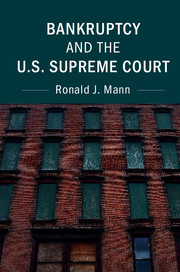Book contents
- Frontmatter
- Contents
- List of Figures
- List of Tables
- Preface
- Introduction
- PART I SETTING THE STAGE
- PART II THE HARD CASES
- SECTION A MISSED OPPORTUNITIES: CONGRESS, THE COURT, AND THE BANKRUPTCY CLAUSE
- SECTION B INTERPRETIVE STRATEGY: THE COURT, THE SOLICITOR GENERAL, AND THE CODE
- PART III AMICI AND THE COURT
- PART IV CONCLUSION
PART III - AMICI AND THE COURT
Published online by Cambridge University Press: 04 May 2017
- Frontmatter
- Contents
- List of Figures
- List of Tables
- Preface
- Introduction
- PART I SETTING THE STAGE
- PART II THE HARD CASES
- SECTION A MISSED OPPORTUNITIES: CONGRESS, THE COURT, AND THE BANKRUPTCY CLAUSE
- SECTION B INTERPRETIVE STRATEGY: THE COURT, THE SOLICITOR GENERAL, AND THE CODE
- PART III AMICI AND THE COURT
- PART IV CONCLUSION
Summary
The secondary thesis of the book is that the absence of a major administrative presence in the Executive Branch has hindered the development of a broad and coherent bankruptcy system. Specifically, the administrative vacuum has left the Supreme Court adrift, underinformed about the importance of a robust bankruptcy system to a modern capitalist economy. Lacking the support of agency-based institutional knowledge and expertise, the Solicitor General has not been an effective proponent of Congress's broad vision of the Bankruptcy Code.
To examine that question directly, this part of the book turns from the case studies to a broader analysis of the role that amici have played in the Court's bankruptcy cases. To organize that presentation, I categorize the various ways in which amici might provide information that influences the Court. As Chapter 1 explains, this is a departure from the existing literature on amici. Scholars commonly consider the contribution of the parties and amici from a strategic perspective – analyzing the likelihood that the contribution of amici will alter the Court's judgment to favor the amici, with the purpose of the brief being to “provide information about the preferences of other actors … relevant to the ability of the justices to attain their [presumably policy-oriented] goals” (Epstein and Knight 1999, 215). That the amici regard the matter as important is information that might affect the Court's ruling, but its relation to the legal issues that the Court confronts in most cases is indirect at best.
This project employs a much more legalist conception of decision making, within which the central question is how the information the amici provide might be relevant to the legal and policy questions that the Justices confront. Recognizing the fluidity of any particular categorization, my reading of the briefs, argument transcripts, opinions, and other materials about these cases suggests three distinct ways in which amici provide information that contributes to the Court's analysis, which I summarize briefly in the paragraphs that follow.
The first, expert knowledge, is the most readily justified. A conspicuous example is the Court's common references to amicus briefs from the American Psychiatric Association as authoritative guides regarding issues like volitional capacity that relate to criminal responsibility. In the same way, the Court often acknowledges (and defers to) the work of academic historians, occasionally with strikingly laudatory descriptions.
- Type
- Chapter
- Information
- Bankruptcy and the U.S. Supreme Court , pp. 193 - 196Publisher: Cambridge University PressPrint publication year: 2017



